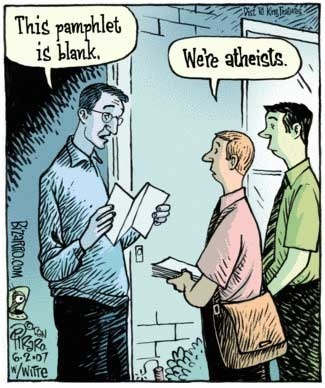Anonymous Atheists
 Should atheists call themselves “atheists”? Some are unashamed of the label. Some do not feel it is even a term of opprobrium, citing surveys revealing that most respondents no longer have their blood pressure rise when they hear the word. Otherwise, they might switch to a less threatening term like “Humanists.” Still others do prefer to call themselves Humanists because they think the “Atheist” tag is too negative: shouldn’t the goal be to run up a flag for what you do believe in, not what you don’t? Others make a slightly different case, suggesting that dubbing oneself an atheist gives priority to the theists and thus makes atheism parasitic upon and derivative from it. I believe it was Sam Harris who urged the dropping of the term, pointing out that, while most people do not believe in unicorns, they do not feel it useful to label themselves “non-unicornists.”
Should atheists call themselves “atheists”? Some are unashamed of the label. Some do not feel it is even a term of opprobrium, citing surveys revealing that most respondents no longer have their blood pressure rise when they hear the word. Otherwise, they might switch to a less threatening term like “Humanists.” Still others do prefer to call themselves Humanists because they think the “Atheist” tag is too negative: shouldn’t the goal be to run up a flag for what you do believe in, not what you don’t? Others make a slightly different case, suggesting that dubbing oneself an atheist gives priority to the theists and thus makes atheism parasitic upon and derivative from it. I believe it was Sam Harris who urged the dropping of the term, pointing out that, while most people do not believe in unicorns, they do not feel it useful to label themselves “non-unicornists.”
But this argument misses a crucial point. Since the norm is not believing in unicorns, the vast majority of people taking it for granted that unicorns are mythical beasties, it would be more natural for any rare believers in unicorns to bear a button proclaiming their heroic minority belief in the pointy critters. Sam would appear to envision the probably far-off day when most of the population will laugh off the notion of God with the same gusto as they sneer at unicorns. Till then, the believers in God are the norm. They need not proclaim themselves theists, because they do not stand out against a vast majority. People who reject belief in a deity do stand out like a sore thumb (and often delight in sticking that thumb in the eye of believers!). Thus it is quite appropriate for them to take the trouble to label themselves as atheists, dissenters from the prevalent belief.
Of course, that’s just if you want to make a point of it. There are non-militant atheists. Atheism describes their position but not their agenda. It is my position, but not my agenda. That might not be readily apparent to you, given the way I often treat religious doctrines and defenders. Tell me if you think the distinction I am about to make is illusory, a distinction without a difference. There are issues of controversy that I care about, paramountly issues of biblical scholarship. I enjoy the discussion among creative and critical students of the ancient texts, and I feel obliged to register my disagreement when I feel scholarship is being opportunistically used or outright distorted for religious propaganda. But I don’t care what people believe. I do not wish everybody believed or disbelieved as I do. Why should I?
Naturally, I bristle at attempts of religious zealots (Christian Dominionists, Islamo-Fascists) to impose their dubious views on everyone else, but that is a very different question. It is the same problem when political zealots seek to impose their ideology on the rest of us. But does it put a crimp in my day to know that most people believe in God? Heck, no. Who cares? I fear that the urge toward evangelism, whether it motivates fundamentalist Christians or militant atheists, stems from an insecurity. Some people feel better, can breathe easier, if most people around them agree with them. Not me. I cannot read minds, so I do not simply assume most propagandists for either religion or irreligion are motivated by insecurity. But it’s a good question to ask yourself. Of course, there are other factors that move some to crusade against religion.
Some point to the terrible crimes committed in the name of religion and suggest, quite reasonably, that the world would be better off without this Pandora’s Box of troubles. But I can’t accept this. You know what comes next: what about Stalin, Hitler, Pol Pot, and so many others whose genocidal schemes and bloody persecutions were not caused by religious zeal? Frequently atheists resort to the pathetic rejoinder that these monsters had adopted a religious style even though they possessed no theological commitments. But this is to equate religion with bloodthirsty fanaticism. Are all the peaceful Methodists and Quakers not really religious because they are not violent? Nonsense. Heads I win, tales you lose. Let’s put every bad thing over in the religious column, keeping all the good stuff for atheism, which can do no wrong.
Why not admit the obvious: too great a trace of animal savagery remains within human nature. This is what led medieval popes to summon the faithful to religious wars of death and plunder. This is what made National Socialists cart Jews off to Auschwitz. There would seem to be nothing inherent in religion to lead to this, nothing intrinsic to Socialism or Communism that implies massacres. It’s good old human nature. If you’re going to play the game of saying “Those weren’t real secularists,” I’d prefer the variant version: “Those weren’t real “humans.” We haven’t evolved enough yet. But give us time.
So says Zarathustra
Robert M. Price's Blog
- Robert M. Price's profile
- 237 followers




